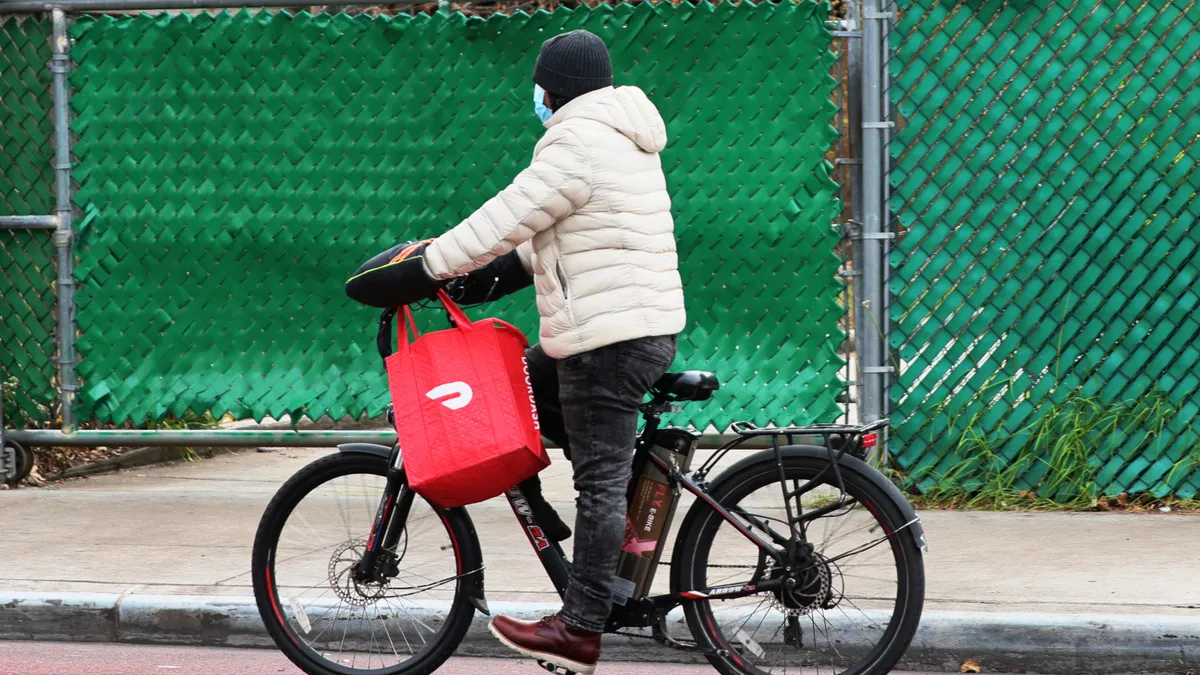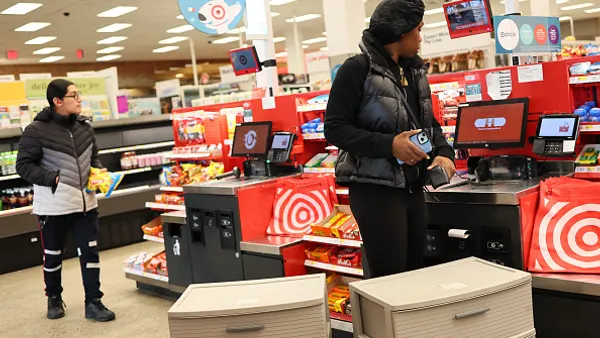Dive Brief:
- New York City’s app-based delivery workers saw total weekly earnings increase to $28.3 million in Q1 2024, a 22% increase over Q4 2023, when the city began enforcing its new $17.96 app-based delivery wage, and a 42% increase compared to Q3 2023, the last full quarter before the implementation of the wage, the city said in a report on the wage’s impact.
- The Department of Consumer and Worker Protection in New York City said that the number of app-based delivery workers logging on-call time declined by about 8%, though its figures do not take into account multi-app usage. The total number of workers carrying out delivery trips fell from 78,000 in Q1 2023 to 75,000 per week a year later.
- Despite the industry’s claims that the wage had resulted in a sharp drop in deliveries the DCWP found that total weekly deliveries increased 8% year-over-year, to 2.77 million. A DoorDash spokesperson called the report “a misleading and blatantly biased assessment of the impact of the minimum pay rules,” and said the company was working on an alternate approach.
Dive Insight:
Base pay is an increasingly large share of delivery worker pay, as tipping has fallen off sharply in NYC. The DCWP found that consumer tips did fall year over year in Q1 2024 by about 66%, from $9.9 million per week to just $3.4 million, while fees paid to the apps by consumers shot up from $12.7 million to $20.1 million per week. Order subtotal increased only modestly over that time period.
As a component of pay, tips fell from an average of $5.83 per worker per hour to $2.31, a roughly 60% decrease from the year-ago quarter. This was offset by a change in average hourly wages from $5.89 to $16.95, an increase of 187% year over year, the report said.
In December, DoorDash shifted the online tipping prompt from before checkout to after checkout — a move the company said was intended as a response to the city’s wage rules.
Josh Wood, a delivery worker involved with Los Deliveristas Unidos — the workers organization whose campaigning contributed to the establishment of the wage rules — told Restaurant Dive, HR Dive’s sister publication, in a May interview that delivery firms were using changes to tip policies as a way to collectively punish workers.
“None of this was the city's doing,” Wood said. “The city didn’t force the companies to restrict access to work. The city didn’t force companies to restrict tips. This was retaliation for the fact that we organized.”
DoorDash denied that the changes to tipping policy were retaliatory, pointing to a city analysis that predicted delivery aggregators might change interfaces to reduce tipping in an effort to constrain consumer costs.
Average hourly wages for delivery workers were below the $17.96 minimum set by the city, according to the report which claimed “some apps maintained excessive levels of uncompensated on-call time during the quarter.” The DCWP said the high level of on-call time was not indicative of a legal violation and that New York permitted this during the phase-in of the wage; additional rules limiting uncompensated on-call took effect April 1.
Labor productivity for NYC delivery workers increased dramatically, according to the report, with trip hours rising from 787,000 hours per week in Q1 2023 to 908,000 hours, while on-call time fell sharply. The average deliveries a worker completed per hour also rose to 1.89, a 25% increase from the same quarter in 2023.
DoorDash claimed that the number of new DoorDash workers and the number of orders placed on its app have fallen, relative to expected growth levels.
Taken in aggregate, the increasing productivity and base pay of workers and the decision by apps like DoorDash to change their shift policies mean the rule has shifted New York City’s delivery work towards resembling regular, scheduled employment rather than gig work. In March, DoorDash announced changes to its worker availability policies and began pushing high-productivity, highly-rated workers to pre-scheduled shifts. Wood said the results have been uneven.
“We are treated like full-time employees when it's convenient for the companies,” Wood said. “We are treated like gig workers when it’s convenient for us. Being able to sign up for a shift and sign on to the apps doesn’t guarantee that we’re going to get any jobs [and] doesn’t guarantee that we’re gonna get paid.”
On April 1, after the period covered by the DCWP’s report, the minimum pay rate rose to $19.56.















